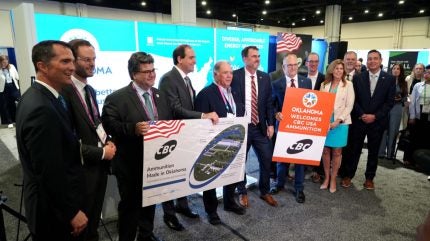
Representatives from numerous non-US companies have told Investment Monitor that they are delaying major US investment decisions as a result of the uncertainty created by the tariffs agenda being pursued by the Trump administration.
Domestic and international delegations at this week’s SelectUSA Investment Summit, the country’s primary foreign direct investment (FDI) event, cited difficulties in planning ahead while the implementation and level of the proposed tariffs remain unresolved.

Discover B2B Marketing That Performs
Combine business intelligence and editorial excellence to reach engaged professionals across 36 leading media platforms.
Speaking to this issue as part of GlobalData’s Instant Insights podcast, Yvonne Bendinger-Rothschild, executive director of the European American Chamber of Commerce in New York, told Investment Monitor: “The problem is more the uncertainty than the tariff itself. I mean, a tariff is a tax, and nobody likes to have a tax all of a sudden put onto them or onto their trade.
“But I think the problem is that we’re constantly going back and forth, you know? If we say there’s going to be a 10% tariff, then people can plan with it to do something and make forecasts. If you think about it, that we have earnings reports that don’t have a forecast in them, that turns every economist’s stomach.”
Ed Brzytwa, vice president for international trade at the Consumer Technology Association, added: “There is a great desire by companies to invest in the United States, but in order to do that, they need predictability and certainty on what the trading environment looks like – not just today, but in the future, both short term, mid-term and long term.
“The current tariff policy – it’s much more of a tariff policy that is a trade policy – does not create that necessary certainty and predictability. As a matter of fact, it leaves companies guessing as to how they can position themselves for success.”

US Tariffs are shifting - will you react or anticipate?
Don’t let policy changes catch you off guard. Stay proactive with real-time data and expert analysis.
By GlobalDataBrzytwa went on to note that the imposition of tariffs could in fact discourage businesses from investing and locating in the US – in contrast to one of the aims stated for them by US President Donald Trump – by raising the cost of importing goods that may be required for manufacturing.
The Summit, which ran from Sunday (May 11) to yesterday (May 14), is said to have been the largest edition to date, with a number of major investments announced to coincide with it. Oklahoma Governor Kevin Stitt announced a $300m expansion in the state by ammunition manufacturer CBC Global Ammunition, and India’s Waaree Energies announced a $200m expansion in its US subsidiary focusing on battery energy storage, for example.
However, it was acknowledged by attendees at the conference that the tariffs being imposed are affecting investment in the US. Indeed, Stitt himself said: “it’s affecting everyone.” He went on to note that aviation companies in Oklahoma had told him they were now at a disadvantage and also referenced impacts for wheat, soybean and cotton producers in the state.
Barry Broome, president and CEO of the Greater Sacramento Economic Council, commented: “California is a big international market. So about 40% of our business activity comes from international markets. 60% are domestic. This year, we’re down about 26% over last year. I think any time you see uncertainty, people put the brakes on complicated projects.”
Navigate the shifting tariff landscape with real-time data and market-leading analysis. Request a free demo of GlobalData’s Strategic Intelligence here.





